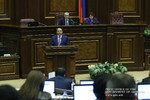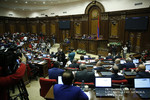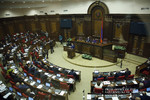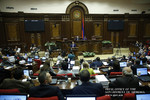Wednesday, 9 December 2015
Remarks Delivered by Prime Minister Hovik Abrahamyan at National Assembly Plenary Session
Honorable National Assembly Chairman,
Dear Members of Parliament,
This year we had a heated State budget bill debate, as usual. We could hear both substantiated queries of economic and political character and proposals to increase funding for various programs.
As in any other country, either in Armenia the State budget cannot meet all the requirements. After all, the main financial document is not just a financial instrument; it is also a statement of political priorities, ambitions and possibilities. Of course, we could make use of a different tactics. We might state more ambitious figures for economic growth, and then explain why they had not been met. I can assure you that given the global economic risks and the geopolitical developments, we could find as many justifications as needed.
I will be frank: during the discussions we faced the temptation to state figures higher than the realistic 2.2%. Nevertheless, I did not give up my principles and insisted that we should represent the reality without embellishments, stating at the same time our visions and priorities in order to foster a sincere dialogue with society, political forces and MPs.
Late in 2014, Armenia’s economy came to be influenced by new developments in the region. Unlike the ones that emerged in 2008-2009, today’s challenges are not only of economic, but also of political or geopolitical character, which means that they are not always predictable. That is why international organizations believe that the situation in the world, and our region, in particular, is far more complicated than during the previous financial crisis.
We have no other choice but to reassess the reform process in tune with the new situation. Therefore, we will reconsider the development plan up to year 2025 as adopted in Match 2014. We will launch a comprehensive revision process, involving the public at large, civil society and all political forces.
First, let me touch on his year’s economic developments. The year-long external turbulences put a significant strain on Armenia’s economic stability. The economic slowdown in partner countries has reduced the consumers’ purchasing power in our main export markets. This curbed our exports significantly, which in turn had a negative impact on business receipts.
Dear Members of Parliament,
While ruble-denominated remittances from Russia increased in January-October, 2015, given the devaluation of the ruble, they fell by about 470 million in dollar terms. Obviously, these developments could have an impact on the population’s purchasing power resulting in an estimated trade reduction of around 5% in ten months. Under such conditions, the pessimists started talking about an inevitable decline in economy. Maybe it would have been so, if it were not for the government’s efforts and resources, as well as the focus on priorities, major programs and non-standard solutions.
Armenia’s economy demonstrated the viability of its overall potential: after all, we boasted a 3.5 percent GDP growth over the past 9 months, the bulk of which was stated in agriculture and the mining sector. Moreover, it came amid decreasing prices of non-ferrous metals on the global market.
I would like to highlight the growth in agriculture. Some may try to attribute it favorable weather conditions. But this is not true. They should not ignore the impact of investments, the launch of new processing plants and the ever increasing amount of arable land.
The setback in consumer spending should not overwhelm the positive trends available in the economy. For example, the average nominal wage amounted to AMD185 thousand in September 2015, an increase of 7.2 percent as compared to the same period of 2014, when inflation stood at 4.7% in the same period.
Thus, even considering the pension allocations, real income is slightly up in our country, while many countries in the region have registered a decline in real wages. In the face of regional developments, when both the consumers and investors are weighing heavily on any deal, continuity of investment should be ensured in the economy.
International organizations and experts agree that in that case it is crucial to step up investment in public infrastructure through temporary increase in the budget deficit. We followed the same path and increased the budget deficit in implementing the National Assembly-approved infrastructure projects in 2015 and raising it up to 3.5 percent in the 2016 budget bill.
Now, let me touch on the loans. Driven by non-professional approaches, our opponents often speculate on the matter of government loans. On listening to them, the impression is created that this government just initiated and signed within a couple of months the loan programs, which are the outcome of lengthy negotiations and have been developed for many years. The reality is different: loans are discussed and agreed upon over a long period of time, because they are targeting problems of a decades-long prospect.
Loans may be divided into three major groups. The first group implies those loans aimed at ensuring balanced territorial development. They may vary and include a major school building program, the first phase of which provides for the refurbishment and seismic reinforcement of about 50 schools nationwide, as well as the construction of sophisticated hospital complexes, medical centers and clinics in the provinces.
The second group implies infrastructure loans, including the for North-South Toad Corridor and other vital roads, power transmission lines to Georgia and Iran, Vedi, Yeghvard, Kaps and Mastara water reservoirs. By the way, the construction of the Vedi reservoir will start as soon as in the first quarter of 2016.
Loans in the third group aim to support the budget. These preferential loans cannot be extended by any international organization without a properly defined reform program, which means that these loans are not a support of last resort for the government; instead they are the proof of the existence of a strategic reform program. They are not meant to fill the gaps in the budget, but to support the implementation of these reforms.
Dear Members of Parliament,
Developments in the private sector are as much important as the State-funded programs. Armenia’s investment position has improved. Foreign direct investment grew by 17 billion drams in 2015 as compared to the first three quarters of 2014 to reach the mark of 125 billion drams in September.
I would like to emphasize that the infrastructure projects initiated by the government have a long-term perspective, which can promote private investment. For example, the construction of power transmission lines to Iran to Georgia has aroused keen interest among private investors.
A few weeks ago, the Government approved a foreign investment program for the construction of a gas-turbine power plant worth over USD 200 million. By the way, this large-scale private investment is not even a penny increase in our national debt, as it does not imply any financial guarantee from the Government.
It is just the case with the Amulsar mining project, which has a long-term perspective, too. It will be developed in 2016. Due to be fully commissioned within two tears’ time, this nearly USD 370 million-worth project will provide more than 1,500 jobs. I am confident that the amount of investments like this will keep growing ahead.
Dear Deputies,
In the context of current global and regional trends, our primary task is to ensure macroeconomic stability and economic growth. My government is often asked about the inadequate use of the export opportunities offered by the Russian market. We should not forget that the government is not an exporter. It is up to the private sector. Instead, the government is supposed to provide the necessary tools by signing specific agreements, working with local manufacturers. We are doing so, but in the meantime, please accept another reality.
At the time the new opportunities emerged, our producers did not have sufficient capacity to respond quickly and were not ready to increase the output. They needed a reasonable period of time to change the product range and the pricing policy, be it agricultural or industrial products, and we should not expect instant success. Success will come only when we learn to help each other and go hand in hand with time.
Jobs will be created only by providing an investment-friendly environment for our exporters who are facing intense competition on external markets. For example, the government did not set up new businesses, but came up with a legislative initiative to provide incentives in the IT sector. The result is obvious: 38 new companies were demonstrating their products at DigiTech Expo this year.
These achievements led us to consider the possibility of launching a public-private sector partnership-based third-generation technological university, which has the potential to become a national program. Take another example. Despite the economic crisis, the government refunded some 10 billion drams in value added tax to exporters this year, making the process faster and easier and stimulating the exports.
We are now discussing the possibility of taking this figure up to 5 billion drams by yearend. To support the frost and hail-affected farms, the government earmarked additional 10 billion drams to secure the payment of deferred loan commitments and affordable loan resources in agriculture. This is a necessary and concomitant, but not sufficient factor to boost exports or ensure growth in agriculture.
There are some questions relating to social affairs. Queries are often voiced at to what the government is doing to preserve the mechanisms of social security. While many countries have already reconsidered their standing social commitments, our government has honored even the emerging and yet non-operational obligations.
For example, by virtue of amendments made to the law on temporary disability benefits, the institute of maternity allowances was introduced and will be effective as of January 1, 2016 to benefit to some 30 000 mothers. Note that as a key factor for achieving a demography breakthrough, this issue used to go unaddressed for many years. To this end, around 4 billion drams will be earmarked from the State budget in 2016.
Dear Members of Parliament,
Next year, we will launch a series of important projects targeting the future. First, as I mentioned earlier, we are going to revise the country’s long-term economic development plan for up to 2025. The second major project is the energy sector development strategy for the period up to 2036 that will set guidelines for this backbone sector, help attract foreign investment and provide prerequisites for sustainable development.
The third important initiative is the adoption of a widely discussed tax reform package, which is the most ambitious and comprehensive one since the years of independence. I have already mentioned the principles that the Finance Ministry should lay in the basis of the new tax package; that is to promote long-term growth not focusing on short-term benefits, improve the attractiveness and competitiveness of the tax system, by specifically concentrating on the taxation of consumption.
The reforms should lead to increased budget revenue in any period of time focusing on collection efficiency as a primary resource for budget receipts and enabling a friendly environment for taxpayers. We should envisage the gradual replacement of benefits with subsidies where it seems feasible to provide targeted assistance to vulnerable groups in case of price hikes. The reforms need to be implemented within 3-5 years in order to ensure their seamlessness and stability in the system of tax administration.
Dear Colleagues,
Winston Churchill once said, “Any intelligent person can always make a plan for victory, provided he is not responsible for its implementation.”
I recalled these words as the budget bill came to be discussed on different platforms, and opinions were voiced that the bill could have been more ambitious with a greater focus on economic growth. True, everything could have been written and said, if you feel free of responsibility; if you are not the one to be blamed for possible shortfalls.
I do believe that those involved in the budget debate should be more responsible in making suggestions and recommendations. I am confident that our country’s well-deserved economic progress can be achieved by mobilizing all healthy parties, discussing any such constructive proposal as may imply not only the laurels of victory, but also a great sense of responsibility.
Such approaches can only be developed on the basis of tolerance, through sharp but constructive discussions, when the jointly adopted decisions will be mandatory for implementation.
Wrapping up my remarks, I would like to emphasize once again: the government has a vision for economic development and the political will to make it a reality based on constructive approaches acceptable to our society.
I am confident that together, we can further develop and strengthen our homeland, our Armenia.










